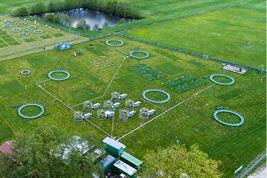16.12.2020

Agriculture is a key socio-economic sector that both influences climate, and is exposed and vulnerable to climate change, extremes and variability. Climate change impact assessments help identify and quantify the risks to this sector, as well as evaluate sustainable adaptation and mitigation strategies. Modelling has usually been carried out for scenarios that both include and exclude the effects of elevated atmospheric CO2 concentration on crops, as the uncertainties were considered too high to exclude one of the two.
An international team of agro-climatic experts, led by Andrea Toreti (JRC) and Delphine Deryng (NewClimate Institute/IRI THESys, Humboldt-Universität zu Berlin), collected and evaluated experimental and modelling research on the effects of elevated CO2 concentrations on crops, and reported their findings in a Nature Food article published on 11th December 2020. Recent efforts and the accumulated evidence, concluded the team, are such that scenarios that exclude the effects of CO2 can finally be eliminated from climate change impact assessments. This represents a fundamental step towards improving the robustness, while narrowing the uncertainties, of climate change impact assessments for agriculture that are used to inform policymakers and to design future adaptation and mitigation pathways. The team also identified key uncertainties and knowledge gaps that still remain, especially on nutritional aspects and on the complex effects of climate extremes. Therefore, the paper proposes a roadmap for the coming years to support targeted experimental and modelling research. This work concludes a 2-year activity of the team started during a workshop on the effects of CO2 on crops co-organised by the JRC and the Agricultural Model Intercomparison and Improvement Project (AgMIP; http://agmip.org) in Ispra in 2018. The paper was co-coordinated by former ZALF scientist Delphine Deryng. ZALF climate change impact modeller, Heidi Webber is also a co-author of the study.
Further information:
